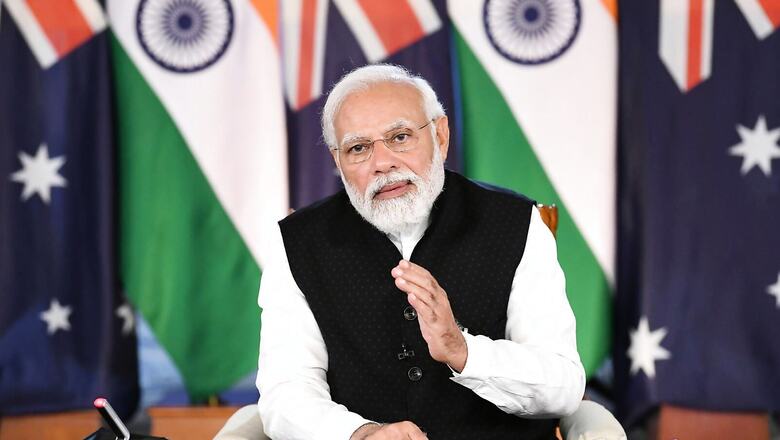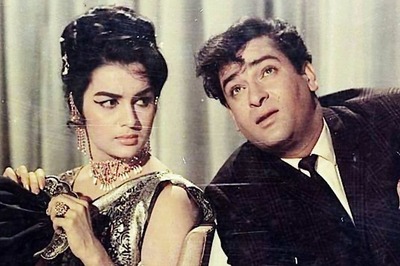
views
He came from Gujarat and had an RSS background. He did not know much English. He did not know a thing about geopolitics. How would he lead India’s foreign policy? Among India’s elite, a Congress-propelled narrative was on the rise around the time of the 2014 general elections — how on earth would someone like Narendra Modi handle India’s foreign policy? Mind you, this narrative was peddled not out of genuine concern for the country’s wellbeing or its global standing, but out of abject spite for one man who had been labelled as a ‘chai wala’.
How would someone who was once a tea seller at a railway platform lead India globally? What would the world think of India? These were the subtle lines being pushed in a bid to somehow avert an imminent Narendra Modi-led BJP victory. This narrative has almost vanished now, and the only person who repeatedly raises the bogey of supposed flailing Indian foreign policy is Rahul Gandhi – a man who is increasingly being viewed as incompetent within the Congress party.
Narendra Modi, on the other hand, has transformed the face of Indian foreign policy. He has proven to be a master of not just the art of diplomacy, but also of deftly handling entire blocs that exist in the world. Today, the United States-led Western camp is desperately trying to court India, while Russia is hailing its ties with New Delhi as historic. China is softening its aggression against India – at least diplomatically. The world today seeks India’s stamp of validation. Every bloc and every country is looking for India’s support. The days of a fragile India looking for Western validation are over.
At the United Nations General Assembly session this year, 10 countries thanked India for its role in providing vaccines to the world and helping nations cope with their food security crisis. India was hailed by countries for being a leading global power. India also got the support of major countries for its UNSC bid.
That’s not all. The UNGA session for India this year was different, and External Affairs Minister Dr S. Jaishankar held marathon meetings with world leaders — about 100 of them. Countries from around the world hoped to secure some time to meet India’s foreign minister, and as explained by Dr S. Jaishankar, that was because there is a belief in the world today that India is a stabilising force that can act as a bridge between blocs. Most importantly, the world wants to know how India is effortlessly fighting global economic upheaval. They all want to learn lessons from India.
The West and East Bridge
Today, India has the ability to publicly call out Vladimir Putin for the war in Ukraine. India also has the capacity to tell the West that it is hardly following Washington or Europe’s lead on Moscow. India today can openly say that the US is not “fooling anybody” by agreeing to sustain Pakistan’s F-16 fighter jet flee. When Narendra Modi told Putin at the SCO summit that “this was not an era of war”, international headlines hailed the Indian Prime Minister for publicly rebuking Russia. Coming from India, the censure meant all the more for American and European countries. They thought India had finally hopped on to the West’s bandwagon, and that it was only a matter of time before New Delhi lay prostrate before them and agreed to toe their line on every issue vis-à-vis Russia.
The West has never been more wrong. As it turns out, India has not condemned Russia’s annexation of Ukrainian territories, and has, in fact, abstained from voting for a UNSC resolution which called for Moscow to be condemned for organising referenda in Ukraine which are viewed by the West and by Kyiv as a sham. India abstaining from voting is significant, and it shows how New Delhi has not abandoned Russia.
A slew of moralistic arguments can be made over why India is wrong for not condemning Russia and not decoupling from Moscow. However, when it comes to Ukraine, such arguments are often devoid of the right context. NATO kept on expanding eastward despite promising the Soviet Union that it would not. Ukraine eyed NATO membership like candy for years, despite Russia warning it that NATO entering Ukraine would have negative consequences for the region. Nevertheless, the West used Ukraine as a pawn for its fight against Russia. Finally, Moscow acted – not in an ideal manner, but in Putin’s eyes, to protest Russian interests. India understands that.
That does not mean India approves of the violence in Ukraine. So, in calling out Putin’s war, Narendra Modi did the right thing. Unfortunately, the West thought Prime Minister Modi’s remarks suggested that India had switched ‘allegiances’ and that he was now part of the anti-Russia front. The West was horribly mistaken. India does not owe any country anything, neither Russia nor the United States. The Modi government’s entire foreign policy apparatus is based on India’s interests being served to their maximum potential. So, when PM Modi made those remarks with Putin by his side, the West pounced to grab the opportunity with both hands and made a grand fool of itself.
A New Era for the World and India’s Position in it
There’s no doubt about the fact that the West is in decline. Europe faces an intense energy crisis that is catalysing a severe economic downturn. Europe stares imminent recession in the face. Latest signs show the United Kingdom meeting the same fate. While European countries head towards blackouts and scramble the face of the earth for drops of fuel, India is flourishing. India got battered by Covid-19. It withstood high energy prices by making wise choices that shielded it from the global fuel bloodbath.
India is the world’s fastest growing economy, and it is expected to become a $5 trillion economy by 2026. India overtook the United Kingdom recently to emerge as the world’s fifth largest economy. India’s foreign policy today is at its strongest. India is in no camp, and also in all camps. Everybody thinks India is their ally and belongs to their camp. India, though, is its own master. Soon, it will be the world’s master. Above all, India recognises that the West is in decline. The West now represents degradation – moral, political, social and most importantly, economic. India represents freshness, strength and righteousness. Modi, Putin and even Xi Jinping know that the West’s era is coming to an end, and that the world is theirs to take.
For someone who was accused of not knowing geopolitics, Prime Minister Narendra Modi is catapulting India to an age of glory. It is no joke for a country of India’s size and scale to defy global economic trends. India is secure in terms of energy supplies. The most developed of nations today cannot boast of having a stable supply of energy. India is secure because its leadership chose realpolitik over Western validation. It chose its own interests above those of the West. India no longer takes orders from powers of an erstwhile era. Instead, India is showing the way to other countries.
India’s foreign policy is the strongest it has been since Independence, and leading it is a man who many said would drive India’s international relations to the ground.
Read all the Latest Opinion News and Breaking News here



















Comments
0 comment